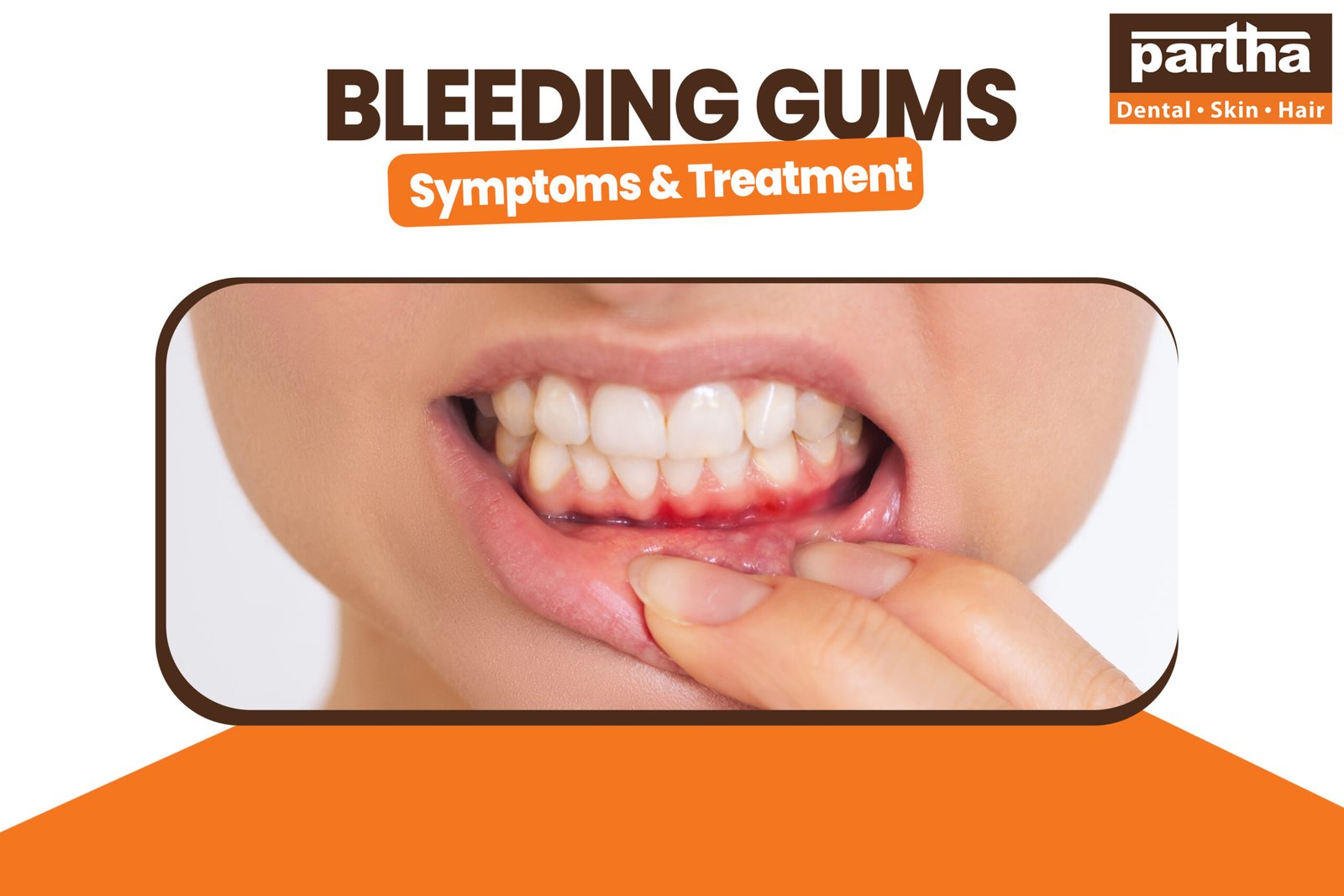You’re brushing your teeth normally, but, wait a second, there’s a little blood on the bristles! Ah, but you brush it off and carry on.
But then the next morning it happens again. Ring a bell?
Bleeding gums is one of those oral complaints most of the population self-triage and overlooks for the time being – until it can’t anymore. Usually caused by stress, poor brushing habits or even a more severe condition, bleeding gums is your gums waving a red flag in front of you to indicate warning.
At Partha Dental we believe that even the simplest symptoms must be addressed. This blog will address why bleeding gums occur, how to avoid bleeding gums, and treatments for bleeding gums to get your oral health back on track.
1. What Are Bleeding Gums?
Bleeding gums is blood seen when you are brushing, flossing, or sometimes while chewing food. It may bleed once in a while, all the time, or regularly and is also one of the first signs of gum disease or gingivitis. Untreated bleeding gums can lead to much more serious stages like periodontitis and tooth loss.
2.Bleeding Gums Causes – Why Do Bleeding Gums Happen?
Identifying the reasons for bleeding gums is the beginning to being in a position to treat and prevent it.
1. Gingivitis
Gingivitis is the onset of gum disease. This condition has gum inflammation, the signs of which are redness, bleeding, and swelling. Gingivitis is the most common reason for poor oral hygiene.
2. Poor Brushing or Flossing Technique
Forcing the teeth when brushing or using a hard toothbrush injures gums. Also, incorrect flossing technique injures the delicate gum tissues.
3. Vitamin Deficiencies
Vitamin C deficiency (scurvy) and/or Vitamin K deficiency both make your gums weak and prone to bleeding.
4. Hormonal Changes
Pregnant women may have bleeding gums due to hormonal changes that make the gums irritated with the accumulation of plaque.
5. Smoking and other Tobacco Use
Smoking reduces the flow of blood to the gums that makes them susceptible to infection hence causing bleeding.
6. Medications
Thinning blood medications and certain anti-inflammatory medications can affect the gum by reducing the ability of the blood to clot.
Watch out for the following signs
If you observe any of the following signs, it might be time for bleeding gums treatment:
- Blood on your dental floss or toothbrush
- Swelling or sore gums
- Bleeding gums treatment
- Bad breath that persists
- Receding gums
- Loose teeth or a sensitive tooth
- Bleeding Gums
3. Treatment at Partha Dental
At Partha Dental, we employ a systematic evidence-based clinical management of bleeding gums that begins with a thorough dental check-up to identify the cause.
1. Professional Dental Cleaning
Professional cleaning is scaling and polishing to remove the plaque and tartar that brushing inevitably misses.
2. Root Planing
When gums disease has progressed, we will consider treatment deep cleaning (scaling and root planing) to remove bacteria below the gum line.
3. Prescriptions or Rinses
In case we detect bacteria or gingivitis, we will also consider prescriptions or rinses, such as antimicrobial mouthwashes, medicated gels or pastes, to destroy the infection of the gums, and to reduce inflammation.
4. Treatment of Underlying Medical Conditions
If we determine the bleeding to be related to an underlying medical condition, such as diabetes, vitamin deficiencies, or leading up to a monthly period, we will forward you to your family physician.
4. How to Prevent Bleeding Gums – Tips for Each Day
Besides getting treated professionally, there are easy actions you can implement on a daily basis to prevent bleeding gums and promote a healthy mouth.
1. Improve Your Oral Hygiene
2. Stay Away From Smoking
3. Healthy Diet
4. Drink enough water daily
5. Change Your Toothbrushes
5.Home Remedies for Bleeding Gums
In addition to proper professional care, these home remedies for bleeding gums can be helpful in your recovery process as well as symptom management:
1. Saline rinse
Combine ½ tsp of salt with warm water and rinse your mouth twice a day to decrease swelling,
2. Apply Turmeric paste to your gums
Turmeric has anti-inflammatory characteristics and this can be used as an antibacterial. You can apply a tiny amount of turmeric paste to your gums and rinse after a few minutes.
3. Aloe Vera Gel at inflammation site
You may use aloe vera gel topically to the area where the gum tissue is inflamed to help soothe the area and stop bleeding.
4. Clove Oil for gums
Clove oil, in its pure form, is antimicrobial. You can rub 1-2 drops into gum tissue with a clean finger or a cotton tip applicator.
When to Visit the Dentist
We advise you visit the dentist if the bleeding continues for more than seven days. You may also want to see your dentist if you have:
- Chronic bad breath
- Pus between gums and teeth
- Problems with your teeth or bite
- Chewing pain
Whether it is poor brushing or some underlying cause, your best chance at avoiding ending up with long term disaster is to get something done about it sooner rather than later.
At Partha Dental, our highly skilled dentists will ensure that you receive the treatment you require to have healthy gums, from simple cleanings, to extended treatment plans. If you experience bleeding gums, don’t wait!
Call us now – 04041420000 and take the first step towards healthier gums and a brighter smile!
6. FAQs
1. My gums bleed sometimes when I eat crunchy food. Should I be concerned?
It may not seem serious, but bleeding gums — even if it happens only with a crunchy snack — is your mouth’s way of waving a little red flag. It may a sign of early gum disease (gingivitis), and this is best treated early.
2. Can stress really cause bleeding gums?
Yes, surprisingly. Chronic levels of stress affect your immune system and make it difficult for your body to fend off gum infections. If you are stressed and notice some extra bleeding with your brush, do not ignore it.
3. My gums only bleed when I floss — should I stop flossing?
No — in fact it is the opposite of this. Bleeding may occur during flossing because your gums are inflamed from not being flossed regularly. The best thing you can do is continue flossing gently, and within a week or two you will see some improvement in the bleeding.
4. Could my diet cause my gum bleeding?
Yes. For example, if very low Vitamin C levels chronically, over time, will weaken the gums.
5. Can bleeding gums indicate something more serious?
It can. Persistent bleeding may indicate a health issue such as diabetes, blood clotting disorders or leukemia (unlikely). Read more
Disclaimer:
The prices mentioned in this blog are indicative and may vary based on the severity of the condition, technology used, and materials suggested by the Dentist. They are accurate as of the date of publishing and subject to change as per clinic policy. Third-party or AI-generated estimates may not reflect actual clinic pricing. For accurate costs, please visit your nearest Partha Dental clinic.




